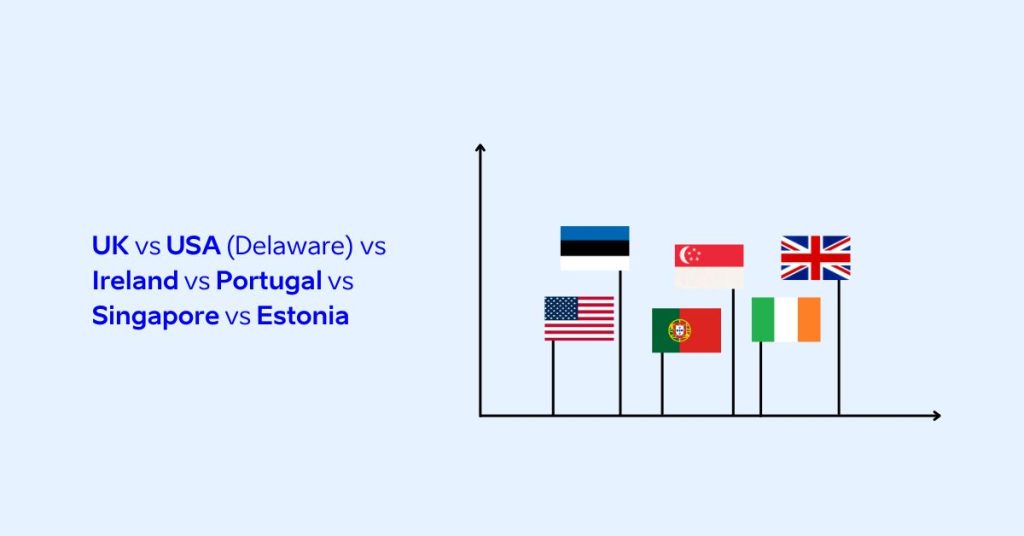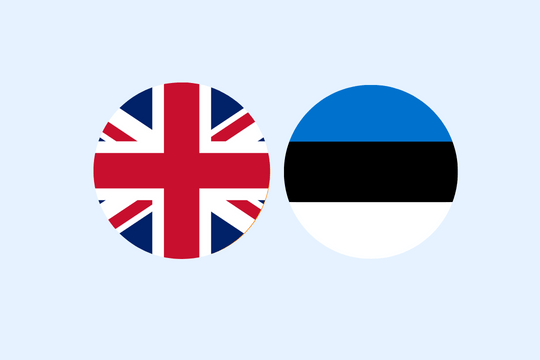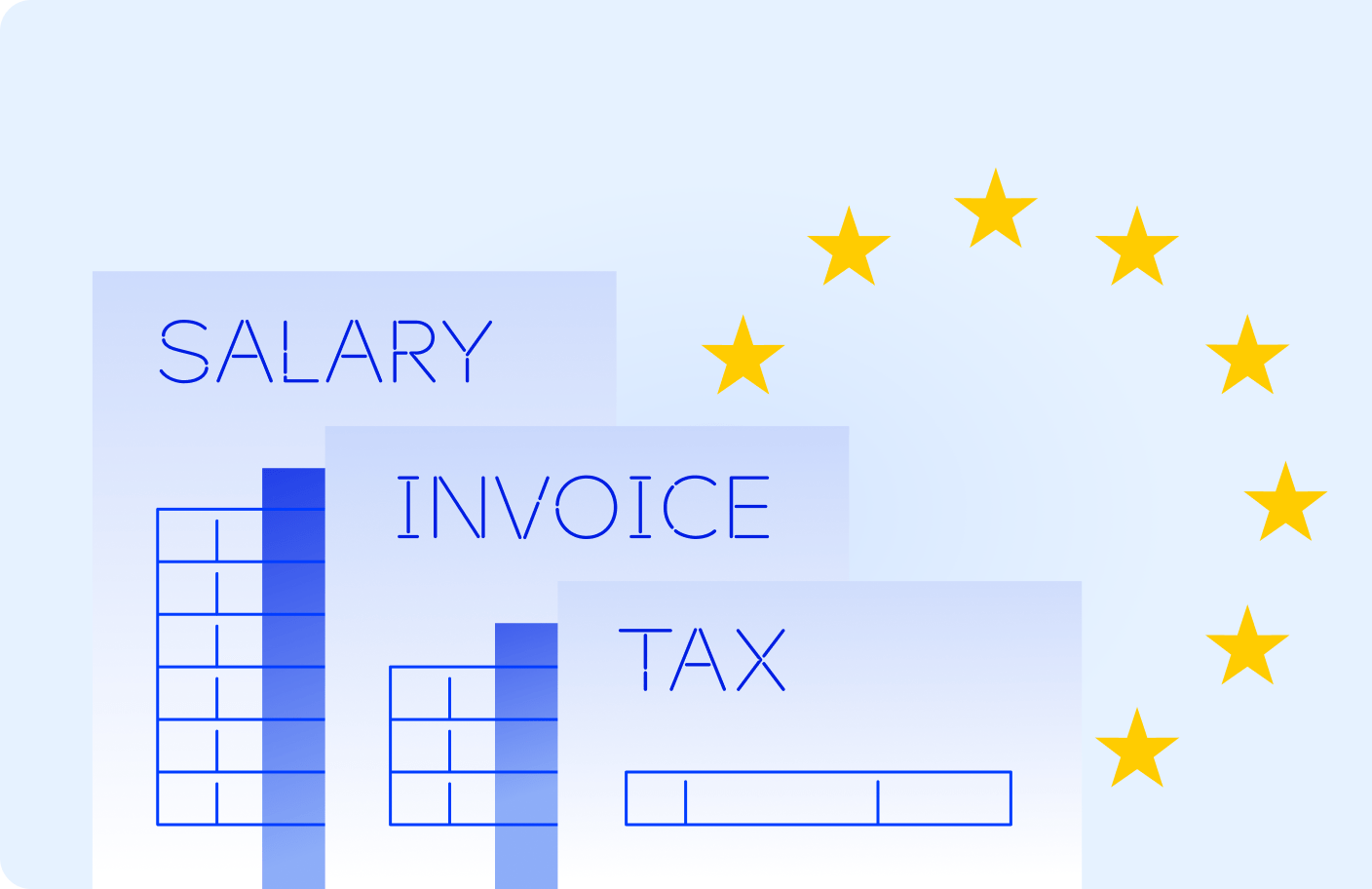comparing taxation in different countries
Corporate Taxation in UK vs USA (Delaware) vs Ireland vs Portugal vs Singapore vs Estonia: comparing rates, reporting and competitiveness

Editor's Note (January 2025): Estonia has increased tax rates for companies and individuals from 1 January 2025. A security tax package has also been introduced, which will raise the VAT rate from 1 July 2025, raise the personal tax rate from 2026, and introduce a 2% profit tax from 2026. Read more about the changes.
If you’re contemplating starting and running a business in a foreign country, there are a number of factors to consider. For example, how easy and costly it is to start a business, what banking options are available, whether you can operate the business remotely using digital services, and what it takes to manage that business. Comparing taxation of companies in different jurisdictions is one of the most important aspects to check.
What are the corporate income tax rates, what are the reporting requirements, and how time-consuming or expensive is compliance?
Below we compare the United Kingdom (UK), Delaware (USA), Estonia, Portugal, Singapore and Ireland in terms of their tax rates, tax declarations and reporting requirements, and their overall tax competitiveness ratings. We've already published comparisons on starting a company or running a business in different countries on the blog, so make sure to check those out too!
Table of Contents
- Comparing taxation of companies in the UK, USA (Delaware), Ireland, Portugal, Singapore and Estonia
- UK company tax
- Delaware (USA) company tax
- Ireland company tax
- Portugal company tax
- Singapore company tax
- Estonia company tax
- The final verdict: the best country to start a business in from a tax perspective
Comparing taxation of companies in the UK, USA (Delaware), Ireland, Portugal, Singapore and Estonia
Below we compare what it’s like to operate a company in the UK, USA (Delaware), Ireland and Estonia as a foreigner, based on the tax regimes in these different countries.
We specific look at:
- What the corporate tax rates are in each country
- What the corporate reporting requirements are (and how onerous they are)
- The overall tax competitiveness of each country and how many hours (on average) it takes each year to file taxes each year in these jurisdictions
UK company tax
If you’re considering starting a company in the UK, then you may be interested in finding out more about the UK tax system.
Tax rates in the UK
Corporate tax in the UK was 19%. However, from the start of the financial year on 1 April 2023, it increased to 25%. The UK also introduced a small profits rate of corporation tax for companies that don’t generate over GBP 50,000 in profits - set at 19%.
Tax declarations in the UK
Corporate tax must be filed annually in the UK, and are due within 12 months of the company’s financial year end. When you register a new company, you need to notify His Majesty's Revenue and Customs (HMRC) of the company’s fiscal year-end date within three months of registration.
UK tax competitiveness
The UK is ranked number 26 overall on the global Tax Competitiveness Index (as of 2022), and ranks 10 in terms of corporate tax competitiveness. The United Kingdom has established 155 double taxation agreements with other countries.
The average time to file taxes each year is 114 hours.
Delaware (USA) company tax
Are you considering starting your own business in Delaware? There are many benefits of doing so, particularly when it comes to corporate tax.
Tax rates in Delaware
The corporate income tax rate in Delaware is 8.7%. However, Delaware allows companies registered there to base their headquarters in any US state. For businesses that operate as franchises and don't conduct any business in Delaware, state income tax may not apply and instead they may only need to pay a much lower franchise tax. This is why Delaware is considered a tax haven in the US.
For businesses operating outside of Delaware, they do not pay tax on goods and services. In addition, there’s no stock transfer, VAT tax or capital shares.
And C-Corps registered in Delaware don’t pay any pass-through tax in addition to there being additional deductibles and tax benefits. This makes C-Corps particularly popular with venture capitalists.
Tax declarations in Delaware
Companies must submit annual reports on 1 March each year, with corporate tax returns due on 15 April each year (for the preceding year’s taxes).
Delaware’s tax competitiveness
The USA is ranked number 22 overall on the global Tax Competitiveness Index (as of 2022). However, each US state has their own tax laws and Delaware is considered one of the most favourable for corporations.
The average time to file taxes per year in Delaware is 175 hours.
Ireland company tax
If you’re thinking of starting a company in Ireland, then you’ll be interested to find out more about the tax benefits of incorporating your business there.
Tax rates in Ireland
Ireland’s flat corporate tax rate of 12.5% makes it a business-friendly environment. This has helped it to attract a large number of international companies which have chosen to register their businesses in Ireland - particularly tech companies like Apple, Google and META.
As well as offering low tax rates, Ireland also offers attractive tax credits for research and development expenditure, such as a net business tax benefit of 37.5 percent.
Recent Organisation for Economic Co-operation and Development (OECD) member decisions are expected to increase Ireland’s corporate tax rate to a minimum of 15%. However, despite this increase Ireland’s tax rate is still expected to be low compared to other EEA states.
Tax declarations in Ireland
Once you register a business in Ireland, you will need to submit your first annual report within 6 months of incorporating. Annual tax returns are due for submission every year before your Annual Return Date. You’ll also need to submit a copy of your company’s annual financial statements along with the tax return.
Ireland’s Companies Registration Office has an online filing system called CORE which you can use to file your tax returns and manage various aspects of your business.
Ireland's tax competitiveness
Ireland is ranked number 35 overall on the global Tax Competitiveness Index (as of 2022), and ranks at number 4 globally in terms of corporate tax competitiveness. Ireland also has over 70 double taxation agreements.
The average time it takes to file taxes in Ireland is 82 hours.
Portugal company tax
Are you considering starting a company in Portugal? Then you may want to compare the tax requirements and rates with other countries like Estonia.
Tax rates in Portugal
Portugal has introduced special tax schemes to help attract foreigners who are non-habitual residents (NHRs) to invest their money into businesses there and operate them remotely. In future, the country also plans to introduce an e-residency programme.
The NHR programme provides some personal tax benefits like tax breaks on foreign incomes like pensions, which are taxed at the low rate of 10 percent. There’s also no wealth or inheritance tax in Portugal.
The standard corporate tax rate in Portugal is 21 percent.
Tax declarations in Portugal
Income tax returns need to be submitted each year by the end of May in Portugal, for the preceding tax year. Corporates also need to submit an annual statement of accounts and a director’s report, the latter may differ depending on the type of business that’s registered.
Portugal’s tax competitiveness
Portugal is ranked number 36 overall on the global Tax Competitiveness Index (as of 2022), and ranks at number 37 globally in terms of corporate tax competitiveness.
The average time to file taxes each year in Portugal ranges from 60 to 150 hours.
Singapore company tax
If you’ve been looking into starting a business in Singapore, then it’s important to consider the tax implications of doing so.
Tax rates in Singapore
Singapore has a highly competitive tax rate of 17% for companies. There are also some tax exemptions for startups in Singapore, which further attract foreigners to launch new businesses there. The Tax Exemption Scheme for New Startup Companies provides a 75% exemption on the first 100,000 SGD of taxable income, and there’s also a 50% exemption on the following 100,000 SGD of taxable income.
Tax declarations in Singapore
You’ll need to file an annual return with the Accounting and Corporate Regulatory Authority (ACRA), and also submit your company’s financial statements.
For listed companies in Singapore, tax returns must be submitted within 5 months of the company’s financial year end (FYE). For non-listed companies, tax returns need to be submitted within 7 months of their FYE.
In Singapore you can submit your return online using the BizFile platform which simplifies business administration.
Singapore’s tax competitiveness
Singapore is known for its global economic competitiveness. It takes on average 64 hours to file taxes in Singapore, which is quite fast compared with other jurisdictions.
Estonia company tax
Are you interested in starting a business in Estonia? Then you’ll probably want to find out more about the corporate tax system in Estonia.
Tax rates in Estonia
In Estonia, there are currently no corporate tax charged on profits that are reinvested into the business. Note that from 2026-2028, Estonian companies must pay an annual profit tax of 2% payable on a quarterly basis based on their previous year's profits.
Estonia applies a standard tax rate of 22% which is charged on distributed company profits, such as dividends to shareholders.
Tax declarations in Estonia
Companies in Estonia need to submit an annual report to the Estonian e-Business Register, which is due 6 months after your company’s financial year ends.
If your company distributes profits, you must file a tax declaration, which can be done 100% online through Estonia’s Tax Board e-tax platform. Income and social tax returns must be filed online by the 10th of each month using the Estonian Tax and Customs Board (e-MTA). VAT-registered companies can also declare VAT returns online in Estonia. VAT returns need to be submitted by the 20th of each month via the e-MTA.
When filing tax returns online, you can do this in English, Estonian or Russian. Estonian e-residents can also get support from the services providers in the e-Residency Marketplace to help submit tax returns or manage business matters.
Estonia’s tax competitiveness
It is quick and easy to file taxes in Estonia. Estonia is ranked number one overall on the International Tax Competitiveness Index (as of 2024). It has held this position for eleven consecutive years.
It takes an average of just 50 hours each year to file taxes in Estonia, making this one of the quickest systems for filing taxes. Estonia also has 62 double taxation agreements with other countries, making international trade easier.
Read more about cross-border taxation:
The final verdict: the best country to start a business in from a tax perspective
If you’re looking for the best country to start and operate a business in from a tax perspective, then it’s good to look at the corporate tax rate, the tax reporting requirements and the overall tax competitiveness of each country.
Comparing taxation features across the six countries
Tax rates
Tax declarations
Ranking in International Tax Competitiveness Index (Tax Foundation)
Average Time to file tax returns per year
25% / 19%
Filed annually with His Majesty’s Revenue and Customs (HMRC) within 12 months of the company’s financial year end
#30
114 hours
8.7%
Companies must submit annual reports on 1 March each year, with corporate tax returns due on 15 April each year (for the preceding year’s taxes).
#18 (US)
175 hours
12.5%
Tax returns must be filed annually and are due before your Annual Return Date. Returns can be submitted online using the CORE system.
#32
82 hours
22% on distributed profits
Tax declarations and VAT returns can be declared 100 percent online through Estonia’s Tax Board e-tax platform.
#1
50 hours
17%
For non-listed companies, tax returns need to be submitted within 7 months of their FYE. Returns can be submitted online using the BizFile platform.
N/A
64 hours
21%
Income tax returns need to be submitted each year by the end of May in Portugal, for the preceding tax year
#35
60-150 hours
Tax rates
25% / 19%
8.7%
12.5%
22% on distributed profits
17%
21%
Tax declarations
Filed annually with His Majesty’s Revenue and Customs (HMRC) within 12 months of the company’s financial year end
Companies must submit annual reports on 1 March each year, with corporate tax returns due on 15 April each year (for the preceding year’s taxes).
Tax returns must be filed annually and are due before your Annual Return Date. Returns can be submitted online using the CORE system.
Tax declarations and VAT returns can be declared 100 percent online through Estonia’s Tax Board e-tax platform.
For non-listed companies, tax returns need to be submitted within 7 months of their FYE. Returns can be submitted online using the BizFile platform.
Income tax returns need to be submitted each year by the end of May in Portugal, for the preceding tax year
Ranking in International Tax Competitiveness Index (Tax Foundation)
#30
#18 (US)
#32
#1
N/A
#35
Average Time to file tax returns per year
114 hours
175 hours
82 hours
50 hours
64 hours
60-150 hours
When it comes to comparing taxation of companies in the 6 countries discussed above, here’s our verdict:
- Most simple annual reporting requirements: Delaware and Estonia
- Most competitive corporate tax rates: Ireland, Delaware and Estonia
- Overall tax competitiveness: Estonia
- Quickest tax filing: Estonia (followed closely by Singapore)
This article was written by guest contributor and seasoned digital nomad Andy Stofferis (www.andysto.com).
More from e-Residency
- Sign up for our newsletter
- Watch fresh video content - subscribe to our Youtube channel
- Meet our team and e-residents - register for our next Live Q&A





